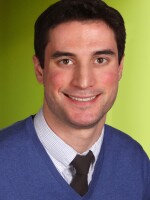Law students have often been used to help solve so-called ‘cold-cases’, but criminal law isn’t the only place their skills are being put to use.
Syracuse University law school professor Ted Hagelin's class focuses on the cutting edge of technology.
Hagelin runs The New York State Science and Technology Law Center, and his students do what’s called technology commercialization research for startup businesses or inventors.
The center has been around for 25 years, but has recently grown its footprint.With millions of dollars’ worth of research happening on college campuses across New York, Hagelin says his center is an important part of transforming that research into economic growth.
"New York state will never get the return on its investment in laboratory research, which it wants to see in terms of growing the economy and high quality jobs, if it doesn’t invest in what we call this commercialization process," argues Hagelin.
Every semester the class tackles two or three new products, doing research on things like possible patent hurdles, and providing advice to the inventors.
In the past, the center has done work for budding Syracuse-based lighting company Ephesus Technologies. One of the projects this semester is a new sensor that monitors the heartbeat of both the mother and baby during childbirth.
Student Justin Burgess says the course work came with a learning curve.
"The first couple [of] weeks was like drinking from a fire hose," Burgess says. "It was a lot coming at you really fast and you had to take it all in and sort it all out. But once you got over the deluge of information, I think it became a lot more manageable."
New generation
The center makes product development more manageable for inventors too. Hiring a private firm to compile this type of report would cost tens-of-thousands of dollars. These students do it for free.
In 2004, the center began receiving state funding and has since helped start offshoot programs at five other schools across the state. Similar centers are at Niagara University, Binghamton University, Stony Brook University, Clarkson University and Rochester Institute of Technology.
Burgess says a challenge for his team has been keeping the inventor of the fetal monitor grounded with realistic goals.
While that may be a bit of a bummer for this particular inventor, Professor Hagelin says overall he’s trying to mold lawyers that add value to the tech industry – and aren’t just buzz killers in the office.
"The reality is today, that business people don't like lawyers because they're always messing the deal, scientists and engineers don't like lawyers," he says. "We're really trying to develop a new generation of lawyers that add value to the technology commercialization process, don't subtract from that process."
You can follow reporter Ryan Delaney on Twitter @RyanWRVO




